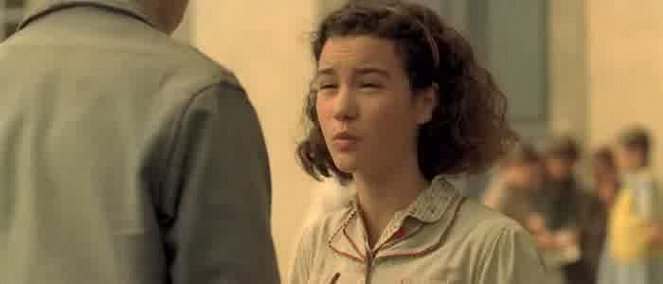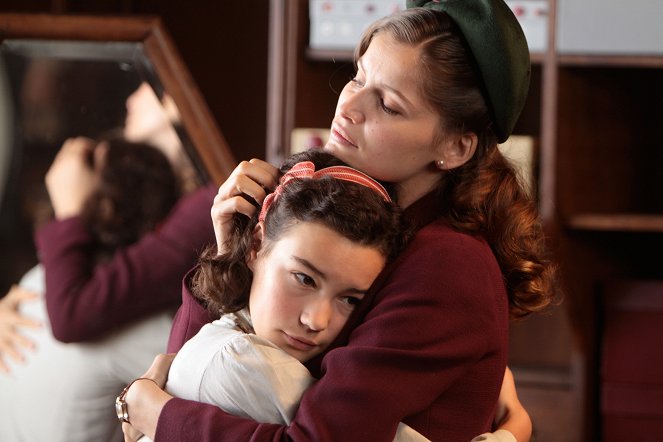Reżyseria:
Christophe BarratierScenariusz:
Christophe BarratierMuzyka:
Philippe RombiObsada:
Laetitia Casta, Guillaume Canet, Jean Texier, Kad Merad, Gérard Jugnot, François Morel, Ilona Bachelier, Marie Bunel, Clément Godefroy, Grégory Gatignol (więcej)Opisy(1)
While the planet is shaken by the terrible events of World War II, another war is been played out in a remote corner of the French countryside. The children of neighbouring villages Longeverne and Velran have always hated each other. Now their battle takes a new turn: prisoners will have the buttons of their clothes removed and return home almost naked, vanquished, humiliated. The ‘War of the Buttons’ has been declared and whichever village collects the most buttons will be declared the victor. Our story folows Lebrac , a tough, troubled but big-hearted 13-year-old and Longeverne’s‘chief strategist’ and his lieutenants: Top Hat, The Cove and their mascot, Little Hat, an irrepressible 8-year-old who takes part with a hilarious seriousness. The arrival of Violette, a young girl from the city, sets hearts racing, most of all that of Lebrac, and romance follows quickly. But Violette’s appearance raises suspicions: she is of Jewish origins and has taken refuge with her alleged aunt, the beautiful Simone, with whom the village teacher is secretly in love. Will Violette’s background be discovered? Will she be denounced? (Wild Bunch Distribution)
(więcej)Materiały wideo (1)
Recenzje (3)
I haven't seen an adaptation in a long time that would be out of it in every way. Barratier chose a completely nonsensical pastel and hyper-kitsch form, which turns a boy's play into a kind of uplifting infantile war drama - but thus takes away from the story all the poetry, playfulness and smiling tension between small deeds and their "big" echoes in the boy's group. Pergaud's book contains the essence of childish squabbles in all non-bindingness, and at the same time does not shy away from responsibility - it catches both main actors in a great and not exactly "sunshine" ending. But Barratier tore up the book, casually scattered parts of the story and the characters throughout the runtime (so they don't make much sense) and connected them with a lifeless ideology: it's no longer just a game, but it reflects on heroism, resistance, republic, race... and unfortunately, War of the Buttons is the most boring teacher and rhetorician - probably also because of the dubbing, which shifts awkward dialogues to theatrical declamation. I do not know why a simple story about boys who grow from hassle to real conflict should be replaced by noble motives of Judaism, defiance and lost love. Especially in this schematic and lifeless form. The forced "instructiveness" of the film would be bearable if it were redeemed at least by a well-told story, strong characters and quality craftsmanship. But War of the Buttons is simply ugly kitsch, unable to convey even a tenth of the emotions and message of the original - the striking fact is how the original derisive tone to the adult world turns the film into the most superficial patriotic agitation about the French resistance (sorry, but this has about the same informative value as Hello, Hello). Yves Robert's great film from 1962 remains fearless with its civil tone, wit and boyish enthusiasm - all the "pseudo-adult" compositions and horribly intrusive music of the new version sound like a very lousy educational joke. Piss on and cut off all the buttons: I do not forgive disgraced childhood idols!
()
Unfortunately, I do not remember the original version of this title, so I cannot authoritatively compare the qualities of both films, but it seems to me that it is a decent work with a decent budget and reasonable technical aspects. The only thing that bothers me is that it tries to be too serious and has an oppressive atmosphere with the threat of Jewish transports, interventions by collaborating authorities, and the ever-present threat of war. The boys' rivalry and the comedic aspect of the story are actually in the background. Furthermore, the film excessively plays on the de Gaulle legend of France fighting and unified against the enemy. The whole town beautifully unites in an effort to help a Jewish girl avoid arrest. The reality was much more complicated and far from idyllic. The support of Vichy France was far from insignificant, and anti-Semitism was deeply rooted in French society. This is more of an educational and idealizing film, but it does not have any significant flaws and is quite likable. Personally, I prefer more humorous categories of films about children, such as the French film Little Nicholas. Overall impression: 70%. In any case, the camera and excellent musical component deserve recognition.
()
To avoid staying only across the pond or on the British Isles, this time we will look to France with another film, straight to one of the greatest classics. "The War of the Buttons" is a book that is well known by children and adults not only in France, but also in other countries in Europe and perhaps even around the world. Yes, we know it in the Czech Republic as well. I saw it a long time ago and didn't remember much from it, so I didn't mind watching the new version. It's new because it also has a French original title. We were satisfied with it just being another "War of the Buttons". The French title, which includes "nouvelle", comes from two facts. The first one is purely pragmatic - in 2011, two films based on a well-known book were released. Both are a bit different in terms of where and when the story takes place. The first one kept the original title "La guerre des boutons", the second adaptation, which I want to talk about today, has that "nouvelle" to differentiate itself. We don't really care, the version I'm reviewing today is the one that got wider distribution. Now, the second reason for "nouvelle". It is also because the original plot was taken and adapted to a different time. The book was written in 1912, so it couldn't emphasize any of the great wars, although it sort of did, of course, long after its release and after the experiences with the wars. The creators of the film "The War of the Buttons" realized this and did nothing else but connected the war about buttons to the war about Europe. Yes, the period is World War II and German penetration into France. We are dealing with fascists here, but it's still mainly about children and their war. I must say that the children don't have to envy the adults, they conduct their war excellently, although of course it's not about bloody battles. There are low blows, power plays, when a group attacks one person, there are traitors, and in the end, revenge. It shouldn't be a children's film though, so that it doesn't end well in the end. The war connection is a bit extra, but it also helped create touching and emotional moments, which the film wouldn't lack in the end. "The War of the Buttons" ultimately ends very quickly, in order to address bigger problems. Love prevails and helps end the war, or at least that's the message. More: http://www.filmovy-denik.cz/2013/02/now-is-good-stand-up-guys-bourne-30.html
()



Reklama